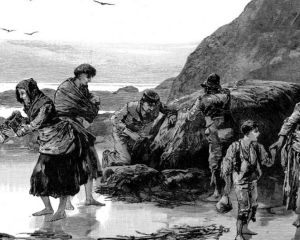And while this was happening, oats, one of rich Ireland's prime exports, were being shipped out.
当西部发生灾难时,燕麦,东爱尔兰的主要出口产品,正在被运送出国。
The man executing government policy at the Treasury was Charles Trevelyan.
执行当时财政政策的人正是查尔斯·屈威廉。
Someone who could see a catastrophe around the corner wrote to Trevelyan, begging him to stop the export of oats.
预见到灭顶之灾即将到来的人给屈威廉写了封信,请求他停止出口燕麦。
I know there is a great and serious objection to any interference with these exports, yet it is a most serious evil.
我明白干涉燕麦出口肯定会遭到严重的抗议,但出口燕麦却是最严重的罪行。
Trevelyan wrote back: We beg of you not to countenance in any way the idea of prohibiting exportation.
屈威廉回信道:我们劝你想都不要想制止燕麦出口。
The discouragement and feeling of insecurity to the trade would prevent its doing even any immediate good.
劝阻出口和对出口的担忧,对现状不会有任何立竿见影的改善。
If the peasants of western Ireland weren't able to grow potatoes, perhaps by labouring on public works, they could earn money to buy food.
如果西部的农民没法种土豆了,也能通过参加公共基础建设赚钱买食物。
This is one of those relief projects -- a road in the Burren in County Clare which goes absolutely nowhere.
在克莱尔郡的巴仑修这条不知通向何方的路就是其中的一项扶贫工作。
But it didn't matter, even these futile jobs got closed down.
其实这些并不重要,因为这些无用的工作也停止了。
So too did the soup kitchens which the government briefly provided, following the example of the Quakers and others.
和教友会等地方一样,原先少数由政府资助的救济处也关门了。
Now there was only one place to go -- the workhouse. Even if you had typhus or dysenteric fever.
贫农们只有一个地方可去了--作坊。伤寒和痢疾患者也不得不出外做工。
Workhouses like this one at Portumna in Galway were filled to overflowing.
在戈尔韦市波塔姆纳这样的作坊里,当时人满为患。
Now workhouses had always been deliberately designed to be as much like prisons as possible to deter anyone who had the slightest chance of a job.
作坊都是尽量设计得像监狱,但凡还有去向的人都不会来此工作。
As the famine developed, the situation here got much much worse, the sick and the healthy placed side by side.
伴随着饥荒的恶化,这里的情况也日益趋紧,健康的人和病患并肩工作。

You'd have to be off your head to want to cross the threshold, but when the alternative was starvation, multitudes were banging at the doors begging to be let in.
除非你不要命了,才会去作坊里做工,但是除了饿死和去作坊别无他选,许多人在作坊门口求着要工作。
After June 1847, to get any relief you had to prove you were at the bottom of the heap, with no more than a quarter of an acre to call your own.
1847年6月后,为了获得补助,必须证明你确实是个贫农,连四分之一英亩地都没有。
Of course, renting one acre of bog or heath didn't exactly make you middle class.
当然,租一亩的沼泽或荒地并不能让你成为中产阶级。
Hundreds of thousands of peasants of course were clinging to their cabins and patches of land, on which they hoped be able one day to grow potatoes again.
几十万的农民当然舍不得他们的草棚和田地,希望有一天能再种上土豆。
Now they were faced with a terrible choice: either turn in that extra land to the landlords to get poor relief, or stay put and starve.
他们面临着艰难的决定,要么将多余的土地交给地主以此获得补助,要么就守着地饿死。
It was no choice at all.
其实他们别无选择。
The hungry converted themselves into the officially landless just to get something to eat, travelling miles to the widely-dispersed workhouses, leaving their plots behind.
饥饿将他们逼到为了吃口饭彻底失去了所有土地,背井离乡徒步行走数公里来到偏远的济贫院讨生活。
It was just the opportunity Irish landlords had been waiting for.
这对爱尔兰的地主们真是天赐良机。
Tenants who tried to stay were forcibly evicted, their roofs smashed in to make sure they didn't return.
想要继续留守的佃户被强制赶走,地主为确保他们一去不回,掀了他们的屋顶。
Now the landlords could stock their acres with sheep and cattle, so much more profitable than peasants and pigs.
这样地主就可以在土地上放羊养牛,比租给农民种土豆养猪赚钱多了。
At the height of the famine, there were too many babies dying either at birth, or in early infancy, for the priests to be able to baptise them all.
在饥荒最严重的时候,许多孩子不是出生时死亡就是过早夭折,牧师都来不及为他们洗礼。
Denied consecrated ground, their fathers carried them to a piece of no-man's land like this,
因为无法入葬于教堂墓地,他们的父亲只能将他们带到像这样的荒凉之地,
on the very rim of the island on the Atlantic shore, and put up a rough stone marker to mark their short, sad life.
在面对大西洋的海岸边简单地竖起一块石头,以此祭奠他们短暂悲惨的命运。













